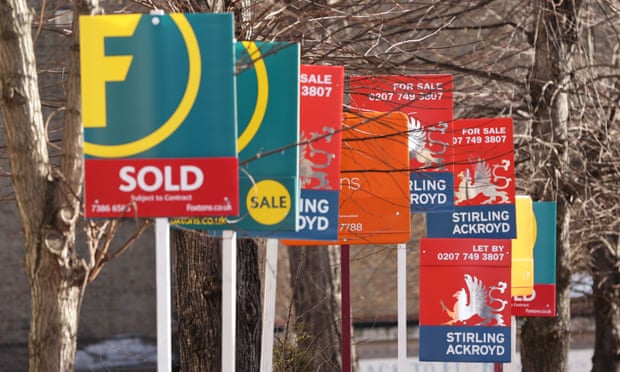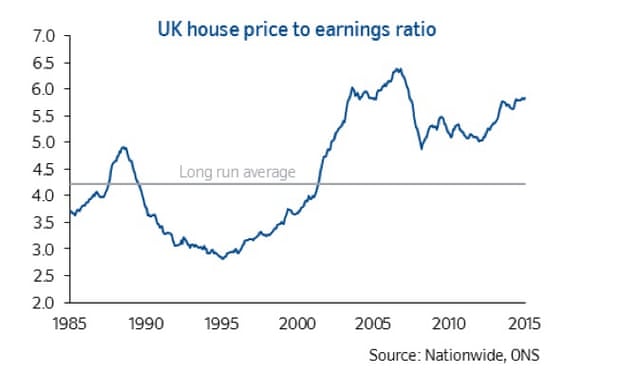Policymakers are facing renewed calls to intervene in Britain’s frothy housing market after Nationwide building society said prices rose by 4.5% this year, taking the average UK house price to nearly £200,000.
The price of the average home increased to £196,999 in 2015, according to Nationwide, while the latest data showed average pay increasing by 2% a year.
Nationwide added that on a month-on-month basis, the 0.8% increase in house prices in December was the strongest monthly rise since April.
“Our concern is that as house prices continue to rise faster than incomes, people are going to find it harder to get hold of a secure home that they can afford,” said Pete Jefferys, senior policy officer at housing charity Shelter.
George Osborne used his spending review earlier this month to promise that he would turn “Generation Rent” into “Generation Buy”.
But campaigners warn that ever-rising prices will put home ownership out of the reach of many, despite government schemes to subsidise first-time buyers.
David King, national organiser for PricedOut, the campaign for lower property prices, said: “House prices continue to rise, impacting on everything from household formation to debt levels – life in the UK as we know it is changing.”
The most rapid inflation has been in the capital, with a home costing 12.2% more in December than a year earlier and the average price in London now more than £456,000. Over the year, the price divide between the north and the south of England widened to nearly £159,000, around £23,000 higher than in 2014.
Nationwide’s chief economist, Robert Gardner, expects house prices to continue rising, by 3% to 6%, over the next year.
“As we look ahead to 2016, the risks are skewed towards a modest acceleration in house price growth, at least at the national level, despite the likelihood of interest rate increases from the middle of next year,” he said. He expects house prices to rise by 3% to 6% over the next year.Prices in London are now an average of 50% above their peak in 2007, before the financial crisis hit. In contrast, property values in Northern Ireland remain 44% below their pre-crisis peak, despite rising by 6.5% in the last three months of the year.
Scotland was the only part of the UK that recorded a fall in average house prices. Values were down 1.9% in the three months to the end of December compared with a year ago.
Howard Archer, chief UK and European economist at IHS Global Insight, forecasts house price growth of 6% in 2016, propped up by continued demand and a dearth of properties coming on to the market for sale.
He added that measures in the autumn statement, including a crackdown on buy-to-let landlords, could also affect the market, with buyers scrambling to complete purchases before new stamp duty charges are introduced in April.
“In the near term, it is very possible that the decision to impose a 3% surcharge on stamp duty on purchases of buy-to-let properties and second homes from April 2016 will lead to an increase in housing demand and exert upward pressure on prices as prospective buyers look to beat the increase.”
The Royal Institute for Chartered Surveyors predicted this month that in some parts of the UK house prices could increase by up to 8% in 2016 as the recovery in London ripples out across the country. It puts East Anglia at the forefront of growth in 2016.
Shelter’s Jefferys called for a series of reforms, including a rapid increase in housebuilding, to bring property price growth under control. “We would like to see a comprehensive plan to build enough homes: 250,000 a year, and we need half of those to be affordable homes.”
He added that the government should also take action to make life more secure for renters, including the many families unable to afford to buy their own home. “Lots of people are going to be stuck renting long term and they need a much better offer: give them security,” he said.
Some economists have started to warn that rapid inflation in the housing market may be creating an unsustainable bubble. Jo Michell, senior lecturer in economics at the University of the West of England, warned that if interest rates rise from their record low of 0.5%, the market could start to look fragile.
“If interest rates rise, then there will be a pinch point,” he said. He pointed to rapid growth in credit card borrowing as another sign of stress in the economy. “Levels of debt are really quite high. My feeling is that all these indicators are starting to look a bit worrying”.
The Bank of England has kept interest rates at their record low since March 2009; but it has recently signalled that it is considering using new “macroprudential” powers to rein in parts of the housing market, including buy-to-let.
In a bid to prevent new bubbles inflating and avoid future financial crises, the chancellor has given the Bank’s financial policy committee a series of levers, including the ability to force banks to restrict lending.
In its latest Financial Stability Report, published earlier this month, the Bank said it would be closely monitoring buy-to-let borrowers, whom it fears may be vulnerable to rising interest rates or an economic downturn.



